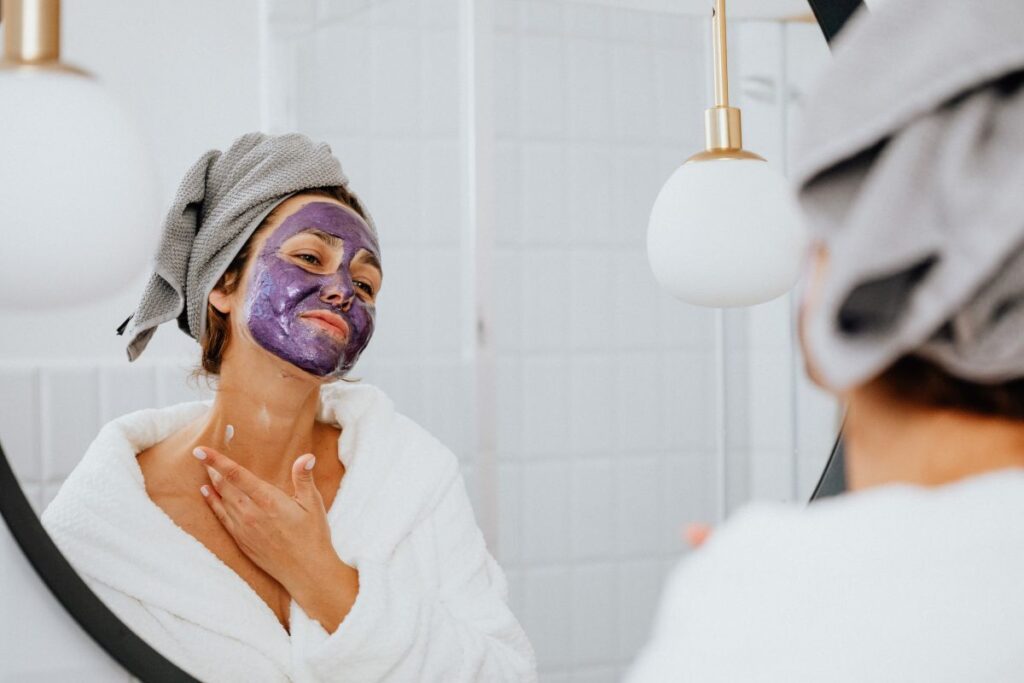Whilst most cosmetics experts caution against a regular change in your pampering regime, a gentle, wholesome reappraisal of your skincare certainly won’t do any harm. And what better time than now and what better excuse than a changing digit on the calendar to do just that?
No matter what regime you follow, you may need to tweak it from time to time based on your skin’s changing needs. Many factors, including your diet, skin type, fitness level, sleep cycle, and overall health can affect your skin, and it doesn’t hurt to occasionally make subtle tweaks in order to optimise your skincare routine so you’re looking as vibrant and youthful as you deserve.
With some patience and consistency, and based on your skin’s needs, you can adjust your routine to restore its glow. And the goods news is that it doesn’t have to be costly or complicated. With that in mind, here’s how to refresh your skincare routine in 7 simple steps, IDEAL for a glowing complexion.
CLEANSE DAILY FOR FRESH SKIN
As any implausibly fresh faced person will tell you, cleansing your pores of sweat, dirt, makeup and impurities is the first step to revitalising your skin. Ideally, you should cleanse twice a day: in the morning before you apply your beauty and skincare products, and at night, to remove all impurities that may have built up during the day.
If you’re not doing that as standard, now is the perfect time to start. Use a fragrance-free cleanser that suits your skin type; gel or cream cleansers are great for dry, sensitive skin while foaming cleansers work well with oily skin. Those who are particularly prone to acne, on the other hand, should stay well away from oil-based cleansers. Daily cleansing will give you the freshest, cleanest skin, ensuring that you get the most from your products.
There are many effective cleansers to choose from when you are refreshing your skincare routine. Some of our favourites include Cetaphil, The Ordinary, and Fossette Paris, which are ideally suited for removing all of the dirt, oil, and makeup that can build up on your skin over the course of a day or night.
The Ordinary boasts the key ingredient squalane, which is a naturally occurring antioxidant similar to your skin’s own oils that has many benefits, including hydrating your skin and protecting its barrier without clogging pores. Cetaphil, on the other hand, has long championed now buzzy ingredients in its formulation, from glycerin to niacinamide and beyond.
Another good choice is Fossette Paris which has been formulated for all skin types, including sensitive ones. Enriched with certified organic French camelina and sunflower oils, it nourishes, protects, and leaves your skin soft, supple, and soothed.
No matter which skincare products you choose, using them regularly can help you achieve and maintain healthy, beautiful skin.

APPLY TONER AFTERWARDS FOR A BALANCED pH
After cleaning your face, apply toner using a cotton pad to remove the last bits of oil, dirt, and cleanser from your skin, leaving it refreshed and revitalised. This is an important step that many of us skip; hey, we’re only just hearing about it now!
Toners also help protect the skin by tightening the pores to prevent contaminants and impurities from penetrating the epidermis. Moreover, because cleansing might disrupt your skin’s pH balance, applying toner can help restore it to its normal levels. As simple as this is, toner has the power to completely transform your skincare regime for the better.
EXFOLIATE ONCE A DAY FOR A YOUTHFUL COMPLEXION
Exfoliation is another gravely underestimated step that many people tend to overlook. Wrinkles aren’t the only cause of worn-out looking skin; other factors, such as paleness, discolouration and dryness can make your skin look more weathered, too.
Daily exfoliation removes the older, dead cell on the skin’s outermost layer, improving both its texture and colour. Natural-based products are the best kind you can use, no matter your skin type. Exfoliants with natural ingredients, such as coffee, sugar, sea salt, and cinnamon, will help keep your skin looking young and flawless without disrupting its balance or exposing you to potentially harmful chemicals.

INCORPORATE RETINOL INTO YOUR SKINCARE ROUTINE
In the complicated, confusing world of skincare, Vitamin A is one of the very few ingredients that has been scientifically proven to reduce wrinkles associated with natural skin ageing. It can also keep acne breakouts at bay. Retinol, a fat-soluble form of vitamin A, boosts the production of new skin cells.
In return, this improves skin elasticity, reduces fine lines, and eliminates blemishes. Experts highly recommend incorporating a retinol serum into your routine for younger-looking skin; you’ll find many night creams contain the wonder ingredient, which helps promote cell repair overnight.
That said, heavy amounts of the stuff can be too harsh for some skin types, and you might experience minor irritation, dryness, and redness in the first month or two, until your skin gets used to the increased cell turnover. Generally speaking, retinol isn’t used comprehensively in day creams, as it causes your skin to be prone to damage from the sun.
Make sure you apply a broad-spectrum SPF sunscreen every day, regardless, as retinol tends to increase the skin’s sensitivity to UV rays, as we mentioned.
APPLY TASK SPECIFIC FACE MASKS 1-3 TIMES A WEEK
Face masks come in a whole host of ingredients and are designed for a variety of different purposes. Rather than simply slapping one on and hoping for the best, it’s better to deploy them in a task specific way.
If your skin feels dry, you can apply a hydrating mask, but if it feels oily and greasy, a deep cleansing mask will unclog your pores. On the other hand, if your biggest concern is that your skin looks dull and pale, an exfoliating mask will bring some colour and glow back. Make it a habit to apply facial masks 1-3 times a week for optimum results. You can easily incorporate them into your current regime without disrupting the natural ebb and flow of things.

PRIORITISE PROPER NUTRITION AND HYDRATION
With all this focus on what we’re putting on our faces, it can be all too easy to neglect a mindful approach to what we’re putting in our bodies.
Indeed, you may not think that your diet can affect your skin that much, but the truth is, what you eat and drink has huge consequences for the appearance of your skin.
One of the best possible ways to enhance your skincare routine more holistically is by following a healthy diet and drinking enough water. Include foods rich in vitamin C and antioxidants, such as oranges, nuts, salmon, carrots, avocados, spinach and berries in your diet to get that clear complexion you’ve always wanted.
What’s more, you should try to cut down on processed foods, refined sugars, and unhealthy fats, all of which can speed up skin ageing and cause blemishes. Finally, remember to stay hydrated to flush out toxins from your body and keep your skin supple and radiant, and keep that alcohol consumption under control; it’s a diuretic and can leave your skin dry and dehydrated.
MAINTAIN GOOD SLEEP HYGIENE
A healthy, wholesome lifestyle isn’t complete without a disciplined sleep schedule. Maintain good sleep hygiene and follow a regular waking up and going to bed time to avoid dull, tired-looking skin.
Experts recommend engaging in a consistent nightly routine, shutting down electronics 30-60 minutes before bedtime, and relaxing without too much mental stimulation prior to shutting your eyes. Meditating and breathing exercises can help you relax and put you in the optimum head space for a good night’s rest.
You can also add lavender or chamomile essential oils to an oil diffuser to doze off faster. Make sure your bedroom exudes comfort and tranquility, and invest in quality, cosy bedding so you can sleep soundly and wake up looking and feeling refreshed. And if that’s not enough advice on sleeping, you’ll find more here; our tips on how to sleep through the night without waking.





